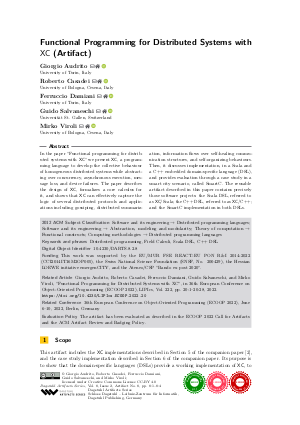Functional Programming for Distributed Systems with XC (Artifact)
Authors
Giorgio Audrito  ,
Roberto Casadei
,
Roberto Casadei  ,
Ferruccio Damiani
,
Ferruccio Damiani  ,
Guido Salvaneschi
,
Guido Salvaneschi  ,
Mirko Viroli
,
Mirko Viroli 
-
Part of:
Issue:
Special Issue of the 36th European Conference on Object-Oriented Programming (ECOOP 2022)
Part of: Volume: DARTS, Volume 8 (ECOOP 2022)
Part of: Conference: European Conference on Object-Oriented Programming (ECOOP)
Part of: Journal: Dagstuhl Artifacts Series (DARTS) - License:
 Creative Commons Attribution 4.0 International license
Creative Commons Attribution 4.0 International license
- Publication Date: 2022-06-23
Artifact Description

PDF
DARTS.8.2.8.pdf
- Filesize: 0.64 MB
- 4 pages
Document Identifiers
Subject Classification
ACM Subject Classification
- Software and its engineering → Distributed programming languages
- Software and its engineering → Abstraction, modeling and modularity
- Theory of computation → Functional constructs
- Computing methodologies → Distributed programming languages
Keywords
- Distributed programming
- Field Calculi
- Scala DSL
- C++ DSL
Metrics
- Access Statistics
-
Total Accesses (updated on a weekly basis)
0PDF Downloads0Metadata Views
Abstract
In the paper "Functional programming for distributed systems with XC" we present XC, a programming language to develop the collective behaviour of homogeneous distributed systems while abstracting over concurrency, asynchronous execution, message loss, and device failures. The paper describes the design of XC, formalizes a core calculus for it, and shows that XC can effectively capture the logic of several distributed protocols and applications including gossiping, distributed summarization, information flows over self-healing communication structures, and self-organizing behaviours. Then, it discusses implementation, in a Scala and a C++ embedded domain-specific language (DSL), and provides evaluation through a case study in a smart city scenario, called SmartC. The reusable artifact described in this paper contains precisely those software projects: the Scala DSL, referred to as XC/Scala; the C++ DSL, referred to as XC/C++; and the SmartC implementation in both DSLs.
Cite As Get BibTex
Giorgio Audrito, Roberto Casadei, Ferruccio Damiani, Guido Salvaneschi, and Mirko Viroli. Functional Programming for Distributed Systems with XC (Artifact). In Special Issue of the 36th European Conference on Object-Oriented Programming (ECOOP 2022). Dagstuhl Artifacts Series (DARTS), Volume 8, Issue 2, pp. 8:1-8:4, Schloss Dagstuhl – Leibniz-Zentrum für Informatik (2022)
https://doi.org/10.4230/DARTS.8.2.8
BibTex
@Article{audrito_et_al:DARTS.8.2.8,
author = {Audrito, Giorgio and Casadei, Roberto and Damiani, Ferruccio and Salvaneschi, Guido and Viroli, Mirko},
title = {{Functional Programming for Distributed Systems with XC (Artifact)}},
pages = {8:1--8:4},
journal = {Dagstuhl Artifacts Series},
ISSN = {2509-8195},
year = {2022},
volume = {8},
number = {2},
editor = {Audrito, Giorgio and Casadei, Roberto and Damiani, Ferruccio and Salvaneschi, Guido and Viroli, Mirko},
publisher = {Schloss Dagstuhl -- Leibniz-Zentrum f{\"u}r Informatik},
address = {Dagstuhl, Germany},
URL = {https://drops.dagstuhl.de/entities/document/10.4230/DARTS.8.2.8},
URN = {urn:nbn:de:0030-drops-162068},
doi = {10.4230/DARTS.8.2.8},
annote = {Keywords: Distributed programming, Field Calculi, Scala DSL, C++ DSL}
}
Author Details
Funding
This work was supported by the EU/MUR FSE REACT-EU PON R&I 2014-2022 (CCI2014IT16M2OP005), the Swiss National Science Foundation (SNSF, No. 200429), the Hessian LOEWE initiative emergenCITY, and the Ateneo/CSP "Bando ex post 2020".
Artifact
DARTS-8-2-8-artifact-a86d8900a526e46a96e36680e4e6a95b.zip
(Filesize: 5.42 GB)
MD5 Sum:
a86d8900a526e46a96e36680e4e6a95b
(Get MD5 Sum)
Artifact Evaluation Policy
The artifact has been evaluated as described in the ECOOP 2022 Call for Artifacts and the ACM Artifact Review and Badging Policy
Related Article
- Giorgio Audrito, Roberto Casadei, Ferruccio Damiani, Guido Salvaneschi, and Mirko Viroli, "Functional Programming for Distributed Systems with XC", in 36th European Conference on Object-Oriented Programming (ECOOP 2022), LIPIcs, Vol. 222, pp. 20:1-20:28, 2022. https://doi.org/10.4230/LIPIcs.ECOOP.2022.20
References
- Giorgio Audrito. FCPP: an efficient and extensible field calculus framework. In Proceedings of the 1st International Conference on Autonomic Computing and Self-Organizing Systems, ACSOS, pages 153-159. IEEE Computer Society, 2020. URL: https://doi.org/10.1109/ACSOS49614.2020.00037.
- Giorgio Audrito, Roberto Casadei, Ferruccio Damiani, Guido Salvaneschi, and Mirko Viroli. Functional Programming for Distributed Systems with XC. In Karim Ali and Jan Vitek, editors, 36th European Conference on Object-Oriented Programming, ECOOP 2022, June 6-10, 2022, Berlin, Germany, volume 222 of LIPIcs, pages 20:1-20:28. Schloss Dagstuhl - Leibniz-Zentrum für Informatik, 2022. To appear. URL: https://doi.org/10.4230/LIPIcs.ECOOP.2022.20.
-
Giorgio Audrito, Luigi Rapetta, and Gianluca Torta. Extensible 3d simulation of aggregated systems with fcpp. In 24th International Conference on Coordination Models and Languages, Proceedings, Lecture Notes in Computer Science. Springer, 2022. To appear.

- Roberto Casadei. scafi/artifact-2021-ecoop-smartc: v1.2, 2022. URL: https://doi.org/10.5281/ZENODO.6538822.
- Roberto Casadei. scafi/artifact-2021-ecoop-xc: v1.2, 2022. URL: https://doi.org/10.5281/ZENODO.6538810.
- Roberto Casadei, Mirko Viroli, Giorgio Audrito, and Ferruccio Damiani. FScaFi : A core calculus for collective adaptive systems programming. In ISoLA (2), volume 12477 of Lecture Notes in Computer Science, pages 344-360. Springer, 2020. URL: https://doi.org/10.1007/978-3-030-61470-6_21.
- Roberto Casadei, Mirko Viroli, Giorgio Audrito, Danilo Pianini, and Ferruccio Damiani. Engineering collective intelligence at the edge with aggregate processes. Eng. Appl. Artif. Intell., 97:104081, 2021. URL: https://doi.org/10.1016/j.engappai.2020.104081.
- Danilo Pianini, Sara Montagna, and Mirko Viroli. Chemical-oriented simulation of computational systems with ALCHEMIST. J. Simulation, 7(3):202-215, 2013. URL: https://doi.org/10.1057/jos.2012.27.
- Danilo Pianini, Mirko Viroli, and Jacob Beal. Protelis: practical aggregate programming. In Roger L. Wainwright, Juan Manuel Corchado, Alessio Bechini, and Jiman Hong, editors, Proceedings of the 30th Annual ACM Symposium on Applied Computing, Salamanca, Spain, April 13-17, 2015, pages 1846-1853. ACM, 2015. URL: https://doi.org/10.1145/2695664.2695913.
- Mirko Viroli, Jacob Beal, Ferruccio Damiani, Giorgio Audrito, Roberto Casadei, and Danilo Pianini. From distributed coordination to field calculus and aggregate computing. J. Log. Algebraic Methods Program., 109, 2019. URL: https://doi.org/10.1016/j.jlamp.2019.100486.
- Mirko Viroli, Roberto Casadei, and Danilo Pianini. Simulating large-scale aggregate MASs with Alchemist and Scala. In Federated Conference on Computer Science and Information Systems (FedCSIS), volume 8 of Annals of Computer Science and Information Systems, pages 1495-1504. IEEE, 2016. URL: https://doi.org/10.15439/2016F407.
